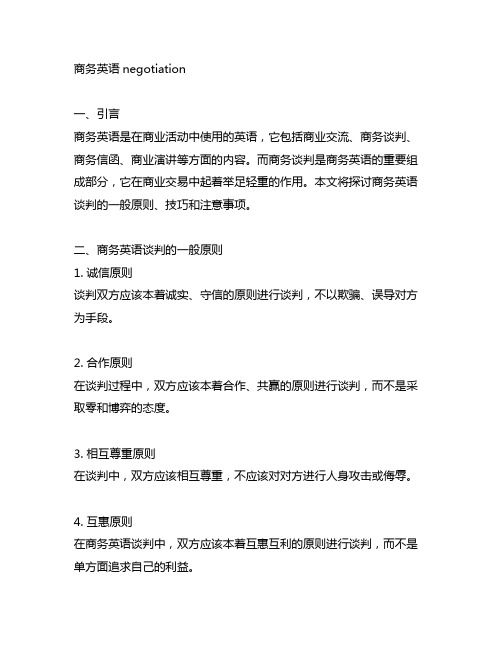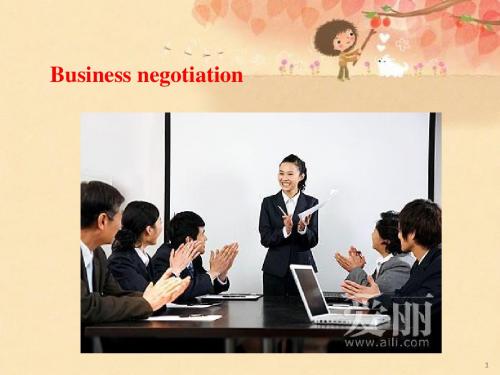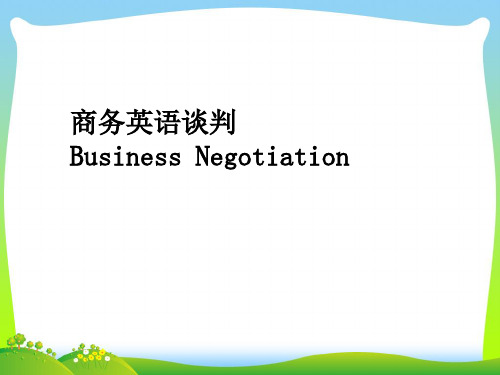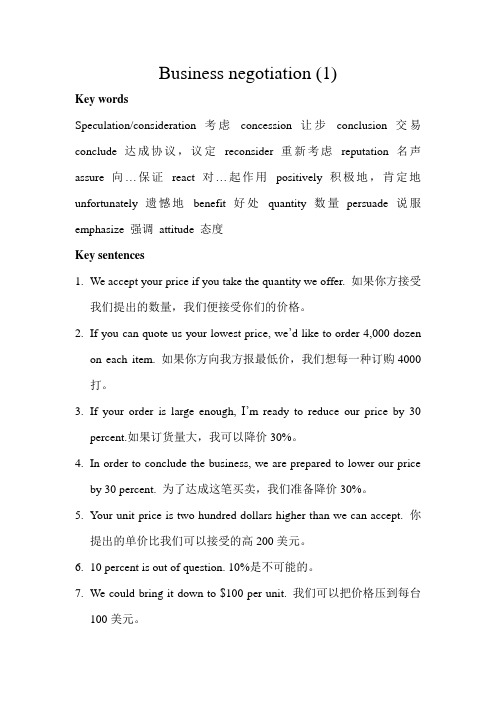Business Negotiation商务英语谈判重点
商务英语negotiation

商务英语negotiation一、引言商务英语是在商业活动中使用的英语,它包括商业交流、商务谈判、商务信函、商业演讲等方面的内容。
而商务谈判是商务英语的重要组成部分,它在商业交易中起着举足轻重的作用。
本文将探讨商务英语谈判的一般原则、技巧和注意事项。
二、商务英语谈判的一般原则1. 诚信原则谈判双方应该本着诚实、守信的原则进行谈判,不以欺骗、误导对方为手段。
2. 合作原则在谈判过程中,双方应该本着合作、共赢的原则进行谈判,而不是采取零和博弈的态度。
3. 相互尊重原则在谈判中,双方应该相互尊重,不应该对对方进行人身攻击或侮辱。
4. 互惠原则在商务英语谈判中,双方应该本着互惠互利的原则进行谈判,而不是单方面追求自己的利益。
5. 灵活原则在商务英语谈判中,双方应该本着灵活应变的原则进行谈判,根据实际情况做出相应调整。
6. 求同存异原则在谈判中,双方应该注重求同存异,找到双方共同的利益点,同时尊重对方的差异。
三、商务英语谈判的技巧1. 语言表达技巧在商务英语谈判中,双方应该注意语言的表达技巧,用词准确、表达清晰,避免产生歧义。
2. 逻辑思维技巧在商务英语谈判中,双方应该善于运用逻辑思维,寻找问题的根源,找出解决问题的方法。
3. 沟通技巧在商务英语谈判中,双方应该善于沟通,倾听对方的意见,及时反馈自己的想法,避免双方产生误解。
4. 调控情绪技巧在商务英语谈判中,双方应该注意调控情绪,避免因情绪强烈而导致谈判破裂。
5. 听取建议技巧在商务英语谈判中,双方应该善于听取对方的建议,做出有效回应,寻找双方都能接受的方案。
6. 技术谈判技巧在商务英语谈判中,双方应该善于运用技术手段,比如数据分析、市场调研等,为谈判提供有力支持。
四、商务英语谈判的注意事项1. 准备充分在进入商务英语谈判前,双方都应该对谈判的内容、目标作出充分准备,以应对各种可能的情况。
2. 注意谈判场地商务英语谈判应该选择一个合适的场地,保证谈判的顺利进行。
商务谈判技巧(businessnegotiation)

1
非语言沟通
注意肢体语言和面部表情的影响
Байду номын сангаас
2
跨文化沟通
尊重他人文化差异,避免误解
解决冲突和妥协技巧
1 寻求共同利益
寻找解决方案中的共同点
2 灵活妥协
做出必要的让步,以达成协议
成功谈判的要点
目标明确
设定明确的目标和期望结果
合作态度
以合作为导向,创造双赢机会
问题解决能力
善于找出解决方案,并执行
总结
准备充分
目标设定和信息收集的重要性
灵活应变
根据不同情况选择合适的策 略和技巧
追求双赢
寻找共同利益,达成满意的 协议
商务谈判技巧
商务谈判的定义和重要性
准备阶段
目标设定
明确谈判目标,确定最优结果
信息收集
收集对方信息,了解其需求和利益
谈判策略
1
竞争策略
通过争取优势,争取更多的资源和利益
合作策略
2
积极合作,达成双赢的协议
谈判技巧
倾听和理解对方
有效倾听,理解对方需求和利益
提出有效论证
使用事实和数据支持自己的观点
沟通技巧
Negotiations国际商务谈判考试重点

Negotiations: a process of communication between parties to manage conflicts in order for them to come to an agreement ,solve a problem or make arrangements. Conflicts: a dispute, disagreement or argument between two or more interdependent parties whodifferent and common interestes.Stakes: the value of benefits that may be gained or lost, and the costs that may be incurred or avoided.Negotiation procedure: 1.introduction of team members 2.negotiation agenda and its arrangement 3. formal negotiation 4. wrapping up.General structure of negotiation:1.determine interests and issues 2.design and offer options 3.introduce criteria to evaluate options 4.estimate reservation points 5.explore alternatives to agreement 6.reach an agreementThe reservation points means the target that negotiators have to achive for assurance of their basic interests.BATNA( best alternative to a negotiated agreement )refers to your last choice between conditions of the other side and the opportunity for other better results.Structure of business negotiations: 1.inquire 2.offer 3.counteroffer 4.acceptanceNegotiation teams: team leaders/professionals/ interpreters/notekeeper/other suggestions for teammembers主谈判人员作用:strong-background knowledge,effective-team spirit,authoritative-decision making(shrewdness, patience, endurance, adaptability, sociable, personal characteristic)谈判地点选择:host venue[enjoying good timing,familiarsurrounding,ready help] guest venue[on spot survey and collecting first hand information] third party’s venue[used when there is no talking channel and for consideration of fairness或者①the two negotiating parties are hostile and antagonistic to each other, or even engaged in a fighting against each other②when a negotiation goes into an impasse and there is no sign of rapprochement③both parties demand strongly to host the negotiation]3C: character/capacity/capitalWin-win concept:(traditional concept)How can both sides win:.hidden agendaCPN(collaborative principled negotiation)合作原则谈判法: to reach a solution beneficial to both parties by way of stressing interests and value not by way of haggling.CPN4个原则①people: separate the people from the problem②interests: focus on intereste not positions③gaining: invent options for mutual gain④criteria: introduce objective criteria Introduce objective criteria客观评判标准: Fair procedures: coin flips/cut and choose/ taking turns/ inherent fairnessLaw of interest distribution利益分配法则: Needs theory(interests of individual negotiators,organization,states Law of two-level game:(International level-(level I)represented by countries, international organizations,enterprises,etc; Domestic level-(level II)represent by government institutions, interest groups,coalition,etc.){how both domestic and international variables interact with each other and jointly influence the result of binational negotiations and thus reveals the law of two level games.}Sources of negotiation power: the state of market /market share/information /time /corporate size and structure/product life cycleHow to decide a person trust or is tursted:1.unchangeable elements[childhood education/professional or special training] 2.changeable elements[past credit record/competence of others to perform a task/intentions of others/reward system]Divides personal styles into five modes:competing/collaborating/compromising/avoiding/accommodati ngFactors causing the change of negotiation power: motivation/denpendence/substitutesPower tactics:time pressure/appearing firm/ridiculing other’s position/building prominence of your offer/threatening the relationshipP(A~B)=M B*D B:A/S B--M A*D A:B/S AP(A~B):{A’s power relative to B(A=self,B=other)}; M B: {B’s motivation for the goals mediated by A}; M A: {A’s motivation for the goals mediated by B}; D B:A:{B’s dependence on A to get the goals}; D A:B:{A’s dependence on B to get the goals}; S B:{B’s substitutes or alternatives satisfying those goals} S A{ A’s substitutes or alternatives satisfying those goals }Negotiations: a process of communication between parties tomanage conflicts in order for them to come to anagreement ,solve a problem or make arrangements.Conflicts: a dispute, disagreement or argument between two ormore interdependent parties whodifferent and common interestes.Stakes: the value of benefits that may be gained or lost, and thecosts that may be incurred or avoided.Negotiation procedure: 1.introduction of team members2.negotiation agenda and its arrangement3. formal negotiation4. wrapping up.General structure of negotiation:1.determine interests andissues 2.design and offer options 3.introduce criteria to evaluateoptions 4.estimate reservation points 5.explore alternatives toagreement 6.reach an agreementThe reservation points means the target that negotiators haveto achive for assurance of their basic interests.BATNA( best alternative to a negotiated agreement )refers toyour last choice between conditions of the other side and theopportunity for other better results.Structure of business negotiations: 1.inquire 2.offer3.counteroffer4.acceptanceNegotiation teams: team leaders/professionals/interpreters/notekeeper/other suggestions for teammembers主谈判人员作用:strong-background knowledge,effective-teamspirit,authoritative-decision making(shrewdness, patience,endurance, adaptability, sociable, personal characteristic)谈判地点选择:host venue[enjoying goodtiming,familiarsurrounding,ready help] guest venue[on spotsurvey and collecting first hand information] third party’svenue[used when there is no talking channel and forconsideration of fairness或者①the two negotiating parties arehostile and antagonistic to each other, or even engaged in afighting against each other②when a negotiation goes into animpasse and there is no sign of rapprochement③both partiesdemand strongly to host the negotiation]3C: character/capacity/capitalWin-win concept:(traditional concept)How can both sideswin:.hidden agendaCPN(collaborative principled negotiation)合作原则谈判法:to reach a solution beneficial to both parties by way of stressinginterests and value not by way of haggling.CPN4个原则①people: separate the people from the problem②interests: focus on intereste not positions③gaining: inventoptions for mutual gain④criteria: introduce objective criteriaIntroduce objective criteria客观评判标准: Fair procedures: coin flips/cut and choose/taking turns/ inherent fairnessLaw of interest distribution利益分配法则: Needstheory(interests of individual negotiators,organization,statesLaw of two-level game:(International level-(levelI)represented by countries, internationalorganizations,enterprises,etc; Domestic level-(level II)representby government institutions, interest groups,coalition,etc.){howboth domestic and international variables interact with eachother and jointly influence the result of binational negotiationsand thus reveals the law of two level games.}Sources of negotiation power: the state of market /marketshare/information /time /corporate size and structure/productlife cycleHow to decide a person trust or is tursted:1.unchangeableelements[childhood education/professional or special training]2.changeable elements[past credit record/competence of othersto perform a task/intentions of others/reward system]Divides personal styles into five modes:competing/collaborating/compromising/avoiding/accommodatingFactors causing the change of negotiation power:motivation/denpendence/substitutesPower tactics:time pressure/appearing firm/ridiculing other’sposition/building prominence of your offer/threatening therelationshipP(A~B)=M B*D B:A/S B--M A*D A:B/S AP(A~B):{A’s power relative to B(A=self,B=other)};M B: {B’s motivation for the goals mediated by A}; M A:{A’s motivation for the goals mediated by B}; D B:A:{B’sdependence on A to get the goals}; D A:B:{A’s dependenceon B to get the goals}; S B:{B’s substitutes or alternativessatisfying those goals} S A{ A’s substitutes or alternativessatisfying those goals }Negotiations: a process of communication between parties tomanage conflicts in order for them to come to anagreement ,solve a problem or make arrangements.Conflicts: a dispute, disagreement or argument between two ormore interdependent parties whodifferent and common interestes.Stakes: the value of benefits that may be gained or lost, and thecosts that may be incurred or avoided.Negotiation procedure: 1.introduction of team members2.negotiation agenda and its arrangement3. formal negotiation4. wrapping up.General structure of negotiation:1.determine interests andissues 2.design and offer options 3.introduce criteria to evaluateoptions 4.estimate reservation points 5.explore alternatives toagreement 6.reach an agreementThe reservation points means the target that negotiators haveto achive for assurance of their basic interests.BATNA( best alternative to a negotiated agreement )refers toyour last choice between conditions of the other side and theopportunity for other better results.Structure of business negotiations: 1.inquire 2.offer3.counteroffer4.acceptanceNegotiation teams: team leaders/professionals/interpreters/notekeeper/other suggestions for teammembers主谈判人员作用:strong-background knowledge,effective-teamspirit,authoritative-decision making(shrewdness, patience,endurance, adaptability, sociable, personal characteristic)谈判地点选择:host venue[enjoying goodtiming,familiarsurrounding,ready help] guest venue[on spotsurvey and collecting first hand information] third party’svenue[used when there is no talking channel and forconsideration of fairness或者①the two negotiating parties arehostile and antagonistic to each other, or even engaged in afighting against each other②when a negotiation goes into animpasse and there is no sign of rapprochement③both partiesdemand strongly to host the negotiation]3C: character/capacity/capitalWin-win concept:(traditional concept)How can both sideswin:.hidden agendaCPN(collaborative principled negotiation)合作原则谈判法:to reach a solution beneficial to both parties by way of stressinginterests and value not by way of haggling.CPN4个原则①people: separate the people from the problem②interests: focus on intereste not positions③gaining: inventoptions for mutual gain④criteria: introduce objective criteriaIntroduce objective criteria客观评判标准: Fair procedures: coin flips/cut and choose/taking turns/ inherent fairnessLaw of interest distribution利益分配法则: Needstheory(interests of individual negotiators,organization,statesLaw of two-level game:(International level-(levelI)represented by countries, internationalorganizations,enterprises,etc; Domestic level-(level II)representby government institutions, interest groups,coalition,etc.){howboth domestic and international variables interact with eachother and jointly influence the result of binational negotiationsand thus reveals the law of two level games.}Sources of negotiation power: the state of market /marketshare/information /time /corporate size and structure/productlife cycleHow to decide a person trust or is tursted:1.unchangeableelements[childhood education/professional or special training]2.changeable elements[past credit record/competence of othersto perform a task/intentions of others/reward system]Divides personal styles into five modes:competing/collaborating/compromising/avoiding/accommodatingFactors causing the change of negotiation power:motivation/denpendence/substitutesPower tactics:time pressure/appearing firm/ridiculing other’sposition/building prominence of your offer/threatening therelationshipP(A~B)=M B*D B:A/S B--M A*D A:B/S AP(A~B):{A’s power relative to B(A=self,B=other)};M B: {B’s motivation for the goals mediated by A}; M A:{A’s motivation for the goals mediated by B}; D B:A:{B’sdependence on A to get the goals}; D A:B:{A’s dependenceon B to get the goals}; S B:{B’s substitutes or alternativessatisfying those goals} S A{ A’s substitutes or alternativessatisfying those goals }。
business negotiation 商务英语谈判

Do you think there is something wrong with the contract? • 你认为合同有问题吗?
We'd like you to consider our request once again. • 我们希望贵方再次考虑我们的要求。
We'd like to clear up some points connected with the technical part of the contract. • 我们希望搞清楚有关合同中技术方面的几 个问题。
• 如果您把质量考虑进去的话,您会发现我 方价格是合理的。
We guarantee quality products which can stand fierce competition. • 我们保证提供能经得起激烈竞争的高质量 产品。
I still have some questions concerning our contract. • 就合同方面我还有些问题要问。
不同商品需要不同的包装。
• Different articles require different forms of packing.
包装费用未算在报价中。
• Packing charges are excluded in the quoted prices.
• The end !
我们将按合同条款交货。
• We'll ship our goods in accordance with the terms of the contract.
我们确信合同会顺利执行的。
• We are sure the contract can be carried out smoothly.
商务英语谈判教材

Let’s meet each other half way.
那我们各让一步吧。
Usually an offer will include the following:
1. name of the goods. 2.quality and specifications. 3. quantity. 4.details of prices. 5. discount. 6. terms of payment. 7. time of shipment. 8. packing
may include: price、 specifications 、 quality 、 packing 、 delivery time 、 payment terms etc.
贸易谈判口译
1. 询盘(inquiry) 在这个环节中经常用的句子有:
Can I make an inquiry? / Could you give us some ideas about your prices? / Will you please inform us of the prices at which you can offer the goods? / I hope to have your quotation for …?
A counter—offer is made when the prospective buyers find any terms and conditions in the offer unacceptable.
Sometimes buyers may take the initiative to make a bid to sellers. If the bid is not acceptable to the sellers, a counter—bid will be made subsequently.
商务谈判英语

Business negotiation (1)Key wordsSpeculation/consideration 考虑concession 让步conclusion 交易conclude 达成协议,议定reconsider 重新考虑reputation 名声assure 向…保证react对…起作用positively积极地,肯定地unfortunately遗憾地benefit 好处quantity 数量persuade 说服emphasize 强调attitude 态度Key sentences1.We accept your price if you take the quantity we offer. 如果你方接受我们提出的数量,我们便接受你们的价格。
2.If you can quote us your lowest price, we’d like to order 4,000 dozenon each item. 如果你方向我方报最低价,我们想每一种订购4000打。
3.If your order is large enough, I’m ready to reduce our price by 30percent.如果订货量大,我可以降价30%。
4.In order to conclude the business, we are prepared to lower our priceby 30 percent. 为了达成这笔买卖,我们准备降价30%。
5.Your unit price is two hundred dollars higher than we can accept. 你提出的单价比我们可以接受的高200美元。
6.10 percent is out of question. 10%是不可能的。
7.We could bring it down to $100 per unit. 我们可以把价格压到每台100美元。
Business Negotiation(商务谈判)

Step 2 – Give reasons. 给原因
☺We can’t sell your products at all at that price.
这么高的进货价格,会导致我们的产品滞销。
☺We can’t make any profit at that price. 这么高的价格,我们将没有任何盈利的空间。
English Training
Topic
Business Negotiation 商务谈判
What will we talk about on a business negotiation? 商务谈判谈什么?
☺Price: 价格
high/ low
☺Shipment: 出货方式
by air/ sea/ railway/ road/ containerization
☺Our products are well received all over the world.
As an exporter 作为出口商
Step 1 – Express the view on price
☺Our price is very low/ attractive/ competitive/ acceptable/ practical/ workable/ on the low side/ reasonable.
☺ The price is very high/not attractive/not competitive/not acceptable/ impractical/unworkable/ on the high side. 这价格太高/没有吸引力/没有竞争力/无法接受/不切实 际/不行。 ☺ I’m afraid the price is too high to be acceptable/attractive. 我恐怕这价格太高了,我无法接受/对我没有任何吸引 力。
BusinessNegotiation商务谈判词汇

BusinessNegotiation商务谈判词汇Business Negotiation商务谈判词汇询价 make an inquiry报价 quotation报/发盘 offer底盘 floor offer实/虚盘 firm/non-firm offer开/收盘 opening/closing price现/期货价 spot/forward price还盘 counter-offer回佣 return commission到岸价 C.I.F.(即Cost, Insurance and Freight)到岸加佣金价 C.I.F.C.(即Cost, Insurance, Freight and Commission)现货 spot goods库存有限 limited stock批发价 wholesale price零售价 retail price净利润 net profit定金 down payment分期付款 payment by installment现金结算 cash settlement信用证结算 payment by letter of credit(L/C)股东 shareholder; stockholder我方 on our part双赢战略 win-win strategy中止合同 terminate the contract提出索赔 lodge a claim要求赔偿损失 claim for a compensation of the loss/damage贸易索赔 business claim补偿贸易 compenstion trade第二部分词语扩展商品交易会 Commodities Fair经营范围 line/scope of business独家经销代理 exclusive selling agency市场准入 market access机床 machine tools汽车零部件 auto parts电子商务 e-commerce; e-business第三部分例句请给我一个有效期为90天的.C.I.F.报价,目的港为洛杉矶,报价含5%的佣金,,I'd like to hear your quotation on a C.I.F.Los Angeles basis valid for 90 days, with an inclusion of 5% angent's commission in your quotation.。
- 1、下载文档前请自行甄别文档内容的完整性,平台不提供额外的编辑、内容补充、找答案等附加服务。
- 2、"仅部分预览"的文档,不可在线预览部分如存在完整性等问题,可反馈申请退款(可完整预览的文档不适用该条件!)。
- 3、如文档侵犯您的权益,请联系客服反馈,我们会尽快为您处理(人工客服工作时间:9:00-18:30)。
重点:1)What is Negotiation“Negotiation”means “doing business”or a discussion aimed at reaching an agreement.Four main phases of negotiation:The preparing phase (预备阶段)The debating phase (争论阶段)The proposal phase (建议阶段)The bargaining phase(讨价还价阶段)或者是Pre-NegotiationFace-to-Face Negotiation ( At the Negotiation )Post-NegotiationWhat is business negotiationBusiness Negotiation is a kind of discussion aimed at reaching a business agreement or abusiness contract.Four stages in business negotiationnon-task sounding (开局前的试探)task-related exchange of information (交换与谈判目标有关的信息)persuasion (说服)concessions and agreements (让步与同意)3)Some Issues that Chinese Corporations and Negotiators Need to AddressChinese businessmen tend to have business negotiations in a rather indirect manner, as opposed to the direct manner of American businessmen.The decision-making process of Chinese companies is generally both slow and time-consuming. On the other hand, American companies usually operate with quick decision made by the top management.Different Business Communication Styles between China and the USAManner: Direct Manner / Indirect MannerDecision-Making: Quick, Top-Down / Slow, Tine-ConsumingWork Ethic: Individual Oriented / Social PressureValue Results more than its Process / Community Belonging, Priority to Planning Merits: Efficiency / Encourage CooperationCompetition in Workers / more HumaneDemerits: Frustrating Workers / Lack of Efficiency and Competition4)China’s Foreign Trade PolicyThe principle of China’s foreign trade is “equality, mutual benefit and exchanging what onehas for what one needs”.(平等互利,互通有无)5)An Introduction to the Five Links of International Business NegotiationEnquiry (询盘)Offer (发盘)Counter-Offer (还盘)Acceptance (接受)Conclusion of a Contract(缔结合同)Of course, it is not necessary to have all the five links taken for every transaction. Sometimes, only offer and acceptance will do. It is stipulated in the laws of some countries that only offer andacceptance are the two required factors, failure of which will make no contract.Brief Introduction to Incoterms®2010Incoterms are used in international import/export contract to show the responsibility of the buyers and the sellers. They define who is responsible for “freight”or “carriage”(transportation) , insurance against risks, “duty”(tariff) and “clearance”(import and export documentation).The word “INCOTERMS”is short for International Rules for the Interpretation of Trade Terms, and most frequently used in international sales transactions.The latest version is INCOTERMS ® 2010, which already became effective on Jan. 1st 2011. Previous versions, including INCOTERMS 2000, are now outdatedThe ® sign means a registered trade mark, it became a necessary part of Incoterms ®2010 International Tender or Bid 国际性招投标Concepts Related Tender or Bid onTender 投标(British English)Bid 投标(American English)submit a tender / bid(submission of tender / bid)投标Tenderer or bidder 投标者Winning bidder / successful tenderer 中标者To invite tender / bid 招标Invitation for (to) tender / Bids 招标Tenderee / the bid inviting party 招标人/ 招标方Generally speaking, people often using tendering / bidding to refer to invite tender / bid and tender / bid.Tendering / Bidding 招投标International tendering / international bidding 国际招投标Submission of Tender (投标)Tenders’/ Bidders’behaviors to deliver their bid / tenders forms to the tenderee according to the conditions of the Tender notice within the specified period of time.投标人根据招标公告或招标单规定的条件,在指定的时间内向招标人递盘的行为。
Legally, the tender / bid is an offer, which is equivalent to the offer in international trade negotiation.在法律上投标属于要约,相当于国际贸易谈判中的发盘。
General Procedures of Bidding 招标基本程序Preparation of Bidding Documents编制招标文件或标书Publicizing the Invitation for Bids发布招标邀请书Preparation of Bids编制投标书Submission of Bids递送投标书Opening and Evaluation of Bids开标与评标Award决标8)Definition of International Investment 国际投资的定义The international investment is a form of the cross-border flows of International Monetary Capital and International Industrial Capital. It is a kind of economic activities to invest the monetary capital from a country or region to another country or region in order to realize the value increment.国际投资是国际货币资本及国际产业资本跨国流动的一种形式,是将资本从一个国家或地区投向另一国家或地区以实现价值增值的经济活动。
国际投资可以看成一般投资在国际上的扩展。
它既具有一般投资的特征,又有其国际性的特殊性。
International Direct Investment and International Indirect Investment 按照投资主体是否拥有对海外企业的实际经营管理权,分为:1) International Direct Investment (国际直接投资)国际直接投资,又称为对外直接投资(FDI)、境外直接投资、外国直接投资或海外直接投资,指投资者到国外直接开办工矿企业或经营其他企业,即将其资本直接投放到生产经营中以获取长期利益的经济活动,其特征在于:投资者能够对企业的经营管理拥有有效的控制。
